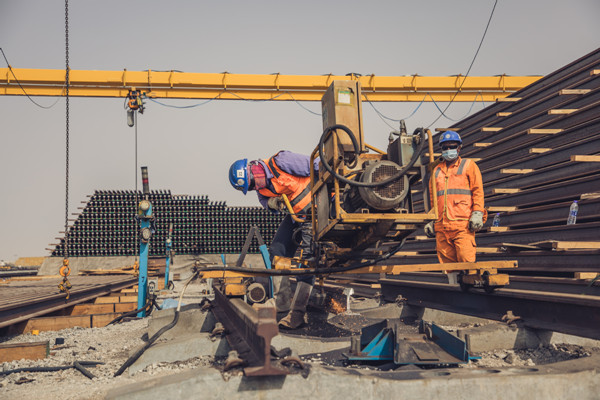Boosting Connectivity with Building Solutions

CSCEC employees ready steel rails for laying track at the construction site of Package A of Etihad Rail's 605-km Stage 2 project in the United Arab Emirates in April. [Photo provided to China Daily]
With 600 projects in 80 markets, CSCEC inks more than 250 infrastructure deals
China State Construction Engineering Corp's Middle East subsidiary is fully engaged in the construction of the 139-kilometer Package A of Etihad Rail's 605-km Stage 2 project, connecting Ruwais and Ghuwaifat in the United Arab Emirates.
Etihad Rail is the developer and operator of the UAE's national railway network. The CSCEC project signifies Chinese companies' unrelenting efforts to help the global community through cross-border cooperation for high-quality development, against a backdrop of extremely trying circumstances created by the COVID-19 impact on economies across the world.
Acceleration of vaccination, however, has created a window of opportunity to press ahead with infrastructure projects that could usher in long-term benefits.
Projects such as the one in the UAE are bringing Chinese and local workers and professionals together to work shoulder to shoulder, underlining a shared humanity and a shared future in a globalized world.
"We work together, we eat together, we sit together and we discuss things together. This bond and coordination are the main reason that we can do a good job in this project," said Alam Gir Khan, project director.
In fact, bilateral cooperation is helping the project construction to progress ahead of schedule.
"Based on the current progress and schedule, works under contract are expected to be completed before Nov 9," said Qiang Lianhe, chief representative of the project.
Taking shape under the Belt and Road Initiative framework, the project involves works like earthwork, and construction of structures like bridges, tunnels, roads and level crossings. CSCEC will also deliver rails and link Package A with Stage 1 of the network.
"We made a promise to complete it three months ahead of the contract date, and we are inching closer to that promise day by day, though it's a tough goal to achieve," Qiang said.
When the rail deal was signed in 2019, Etihad Rail CEO Shadi Malak said project completion ahead of schedule could make an enormous difference to the region.
Etihad Rail's goal is to expand the UAE's railway network in order to improve all aspects of freight transport across the border and around the region, placing it at the center of regional goods movement as a global logistics hub.
"Everyone has worked so hard and contributed to putting this together in such a short space of time and I would like to tell you that I'm proud of each one of you and hope that everyone at Etihad Rail feels a part of pride and joy," said Malak in a letter to the construction team.
As a State-owned building giant, CSCEC, China's largest builder, has been showered with such compliments by its counterparts in many of its overseas markets, as the company has been ramping up its go-global efforts in recent years, especially in the BRI economies.
Apart from the UAE project, the company participated in the construction of Egypt's New Administrative Capital to the east of Cairo, expressway projects in Pakistan and Algeria, helping boost regional connectivity with its building solutions and well-trained teams.
Currently, the company has more than 600 projects in various stages of progress in more than 80 overseas markets. In 2020, CSCEC garnered overseas contracts valued at more than 187.2 billion yuan ($28.9 billion).
It also inked more than 250 overseas deals, with some 30 valued above $100 million, according to company data released on April 19.
The overseas business has also helped the company to gain a total revenue of 1.61 trillion yuan last year, up nearly 14 percent from the 2019 level. Total value of newly inked contracts reached 823.7 billion yuan last year, up nearly 34 percent.
"Innovation is the key to our achievements, and has helped us to brighten our reputation in overseas markets," said Zhou Naixiang, chairman of CSCEC.
Despite the impact of COVID-19 on its operations, CSCEC has been deepening its own reform, in accordance with the nation's call for high-quality development and adoption of the dual-circulation development pattern. The company is committed to strengthening its overall competitiveness with market-oriented strategies, Zhou said.
In 2020, the company invested more than 29 billion yuan in research and development, highly educated talent and achieving breakthroughs in core building technologies. Many of them have been put into use. For instance, CSCEC helped build Huoshenshan Hospital within 10 days and Leishenshan Hospital within 12 days, key projects that helped to treat COVID-19 patients when Wuhan, Hubei province, was hard hit by the virus in early 2020.
As a major force in the development of BRI-related projects, China's SOEs have overcome extreme difficulties. Not a single project under the initiative has shut down production, said Peng Huagang, secretary-general of the State-owned Assets Supervision and Administration Commission of the State Council.
China's SOEs such as CSCEC have been involved in 3,400 BRI projects, with more than 600 completed already.
The BRI has enriched the growth of the world economy and improved people's living standards in economies participating in the initiative, said Zhou Yong, a member of the 13th National Committee of the Chinese People's Political Consultative Conference, during this year's two sessions, the annual sittings of the top legislature and the top political advisory body, in March.
After seven years of development, the BRI has built a solid platform for companies from various countries to carry out cooperation and helped more people in developing a better understanding of mechanisms for development and infrastructure connectivity, said Zhou, who is also vice-president of CSCEC.
